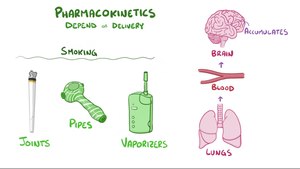Marijuana addiction
| Cannabis use disorder | |
|---|---|
| Video explanation | |
| Classification and external resources | |
| Specialty | psychiatry |
| ICD-10 | F12 |
| ICD-9-CM | 304.3 |
Cannabis use disorder, also known as cannabis dependence, is defined in the fifth revision of the Diagnostic and Statistical Manual of Mental Disorders (DSM-5) as the continued use of cannabis despite clinically significant impairment, ranging from mild to severe.
Cannabis is one of the most widely used drugs in the world. In the United States, 49% of people have used cannabis. Although physical dependence has not been proven, an estimated 9% of those who use cannabis develop dependence. In the US, as of 2013[update], cannabis is the most commonly identified illicit substance used by people admitted to treatment facilities. Demand for treatment for cannabis use disorder increased internationally between 1995 and 2002.
Although not medically serious, cannabis withdrawal symptoms can occur in one half of patients in treatment for cannabis use disorders. These symptoms include dysphoria (anxiety, irritability, depression, restlessness), disturbed sleep, gastrointestinal symptoms, and decreased appetite. Most symptoms begin during the first week of abstinence and resolve after a few weeks. According to the National Cannabis Prevention and Information Centre in Australia, a sign of cannabis dependence is that the person spends noticeably more time than the average recreational user, recovering from the use of, or obtaining cannabis. For some, using cannabis becomes a large part of the person's life and he or she may miss important activities, preferring to use cannabis instead. People who are cannabis dependent will continue to use it even though they perceive their use as problematic.
Cannabis use is associated with comorbid mental health problems, such as mood and anxiety disorders, and discontinuing cannabis use is difficult for some users. Psychiatric comorbidities are often present in dependent cannabis users including a range of personality disorders.
Cannabis dependency is often due to prolonged and increasing use of the drug. Increasing the strength of the cannabis taken and an increasing use of more effective methods of delivery often increase the progression of cannabis dependency. The use of cannabis at a young age such as the teenage years, can have serious impacts on depression and anxiety in youth and later in life.
...
Wikipedia

